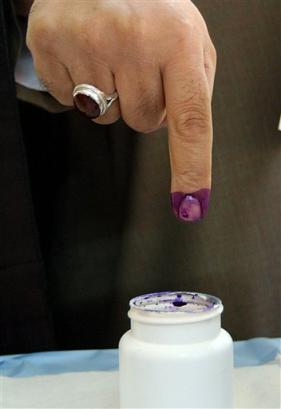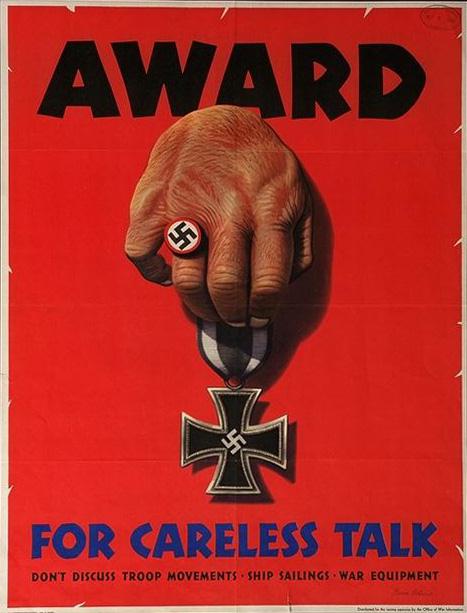December 15, 2005
Go For It!

UPDATED MOVED TO THE TOP FOR THE DAY: I removed my original rather flippant and bellicose remarks. (Sorry, John.) Instead, I'll borrow words from the Divine Peggy Noonan:
Mr. Bush chose to remove Saddam and liberate Iraq from, well, Saddam. And maybe more. Maybe from its modern sorry past. Pat Buchanan said a few months ago something bracing in its directness. He said a constitution doesn't make a country; a country makes a constitution. But today, in the voting, we may see more of the rough beginnings of a new exception to that rule. News reports both in print and on television also seem to be suggesting a turn. They seem to suggest a new knowledge on the ground in Iraq that democracy is inevitable, is the future, and if you don't want to be left behind you'd better jump in. One senses a growing democratic spirit. A sense that daring deeds can produce real progress.'Tis devoutly to be wished, and all of good faith must wish it.
Amen.
(Image stolen from JWookie at Cake or Death.)
YIPS from Steve:
I thought that the above iconic image was wonderfully juxtaposed with this:

O tempora, o mores.
FURTHER YIPS from Steve:
The cool kids over at Pajammies Media are doing their blogjamthing. Much more entertaining than watching Wolf Blitzer in the Ready Room try to find the horror in it all.
Posted by Robert at December 15, 2005 11:14 PM | TrackBackWhile I genuinely do hope Iraq will build a stable democracy, this feels more like meaningless turning point # 357 to me. Each of these turning points, highly touted by the Whitehouse and the media, is typically followed by no real demonstrable improvement on the ground.
Also worth noting the first sentence of that excerpt essentially admits GW perpetrated a war crime (http://jurist.law.pitt.edu/forum/forumnew98.php).
I hate to break it to you, but historically, big and genuine turning points rarely look like big and genuine turning points while they're happening. Instead, they look like a lot of, well, small and meaningless turning points. The actual significance of an event or series of events can only be assessed in hind-sight and we're still only at the very beginning of the Iraqi democratic experiment.
Patience, grasshopper.....
Posted by: Robbo the LB at December 15, 2005 09:38 AMLB Buddy, what "war crime" is "essentially admitted"? Is it the invasion of Iraq, specifically authorized by the Congress? Is it the intelligence upon which W. based his decision (being the same intel used by the prior administration and by the senator from Beacon Hill to assert unequivocally that Saddam had WMDs while W. was still governor of Texas)? Is it the use of force after Saddam violated every one of the terms of the armistice which ended the first Gulf War? Is it the use of force after years of Saddam shooting at Allied aircraft patrolling the no-fly zone? Is it in relying in part upon the sainted UNSCOM weapons inspectors who assured us WMDs were there? Is it for not believing Saddam when he said he destroyed his WMDs (except of course, the occasional mustard gas or cyclosarin shell found by Coalition soldiers or used as an IED)? What "war crime" do you mean?
Posted by: LMC at December 15, 2005 10:00 AMLMC:
Several legal opinions were put forth before the invasion stating explicitly that regime change could not be the objective. One example from the British Attorney GEneral to Blair:
http://www.globalpolicy.org/security/issues/iraq/document/2003/0307advice.htm
Clinton bent over backwards to pretend regime change was not the objective in Kosovo (it was the objective, and yes I think that was a war crime too), for this very reason. It is also why WMD were used as an excuse even though the Downing St. memo showed that even Britian didn't believe Saddam was much of a threat "the facts were being fixed around the policy".
And Rob:
Turning points were legion in the Vietnam war, at least from the generals and the media. So sometimes turning points are just twisting in the wind. Glenn Greewald pulls up the language in speeches during the Vietnam war that are shockingly similar to today's rhetoric:
http://glenngreenwald.blogspot.com/2005/12/contemporaneous-government-statements.html
Posted by: LB buddy at December 15, 2005 10:48 AMHmmmm.... Extended voting hours and ballot shortages due to high turnout Sounds pretty meaningless to me, yup.
So let me get this straight. If the outcome of a war is regime change, the war is unjustified? I'm sure Mussolini and Hitler take comfort in that. But in this case, like in that one, the greater strategic objectives of this war could not be acheived WITHOUT regime change. It was a means, not an end.
Posted by: Brian B at December 15, 2005 11:11 AMLB Buddy: I hate to break this to you but the United States and its officers, including W., are not subject to "war crimes" because of the considered opinion of one British official which is not the policy of any government, including the one for which this official worked. It is entitled to about as much weight as the navel gazing of law professors who never practiced law.
Posted by: LMC at December 15, 2005 11:23 AM"Turning points were legion in the Vietnam war, at least from the generals and the media."
And yet, ironically enough, the real "turning point" of the Vietnam War was the 1968 photo by journalist Eddie Adams of Vietnamese Police Chief Nguyen Loan shooting a Viet Cong officer (whose men, during the opening states of the Tet Offensive, had just been shooting up the Saigon police HQ). The act was well within the bounds of the recognized rules of war and also completely understandable, given what the Cong were doing. But publication of the photo in the States sent an (inaccurate) "message" about the brutality of the South Vietnamese that eventually led to our withdrawal and our subsequent cutting off of the South's monetary and material aid, allowing Hanoi's tanks to roll into Saigon.
Also, if you read the rest of Noonan's article, she too criticizes the White House for trying to put too much of a smiley face on its public mesages about the war when, in fact, it is privately much more aware of the complexities of the task and is dealing with them as they arise.
Posted by: Robbo the LB at December 15, 2005 12:13 PMI guess to me the question was, seen from the time, what was the turning point of the American Civil War?
Posted by: Steve the LB at December 15, 2005 12:22 PMAntietam. The Union victory gave Lincoln the opportunity to issue the Emancipation Proclamation, expanding the war aims of the North from reunification to ending slavery. The North was not doing so well up to that point and issuing the Proclaimation on anything other than the heels of a victory would have been seen as an act of desperation. In transforming the purpose of the war to one of abolishing slavery, it gave Federal soldiers a noble purpose greater than merely restoring the status quo antebellum. They needed it to keep fighting given the carnage of the Civil War.
Posted by: LMC at December 15, 2005 02:04 PMTurning point of the Revolution (aside from Cornwallis's surrender at Yorktown)?
Posted by: rbj at December 15, 2005 02:24 PMCivil War? I'd probably say Vicksburg in the West and Gettysburg in the East. Once the Confederates lost the ability to stop Grant and Sherman in the west, they were doomed; Gettysburg was their last chance to reverse the odds and force a political settlement. Lee had no choice but to gamble at that point. Losing that gamble gave the South no way to win the war, as the west was burning and the east was reduced by siege.
The revolution? Saratoga. Decisive in bringing the Europeans in to support us in the war, and showing that the colonials could, indeed, slug it out against a British army.
Good answers. But to tie them back in to this discussion: When were those turning points first RECOGNIZED as the turning points?
Posted by: Brian B at December 15, 2005 02:51 PMThey weren't at the time. I'm sure the generals saw them as significant. I'd say it was "years later" before the historians figured it out.
What helped save Lincoln in 1864 was the fall of Atlanta. At the time, I think everyone knew that that was significant. They probably regarded that as a turning point, though I think of it more as a part of the denouement.
I think in Iraq, this election is something like the fall of Atlanta -- everyone knows this is big. With the Sunnis voting, it's pretty much over. To me, the Vicksburg or Gettysburg of this war was Fallujah (2d Fallujah, not the earlier abortive siege/compromise).
I think it destroyed any credibility Zarqawi had, because he couldn't prove to anyone that he could beat us. We showed we could take anything of his any time we wanted. I think the smarter folks on his side starting cutting deals. The Western Anbar campaign was like Grant and Sherman cutting the confederacy in half. The death of Zarqawi and the final clearing out of Ramadi will be Appomattox.
Just my armchair views.
Posted by: The Colossus at December 15, 2005 03:01 PMBut those were conflicts between formal armies. One might argue that we're past that stage and now into the post-war muddle. So consider this timeline:
1776 - Declaration of Independence
1781 - Battle of Yorktown, British surrender and passage of the Articles of Confederation
1788 - Articles of Confederation tossed, Constitution adopted
1789 - Bill of Rights ratified
That's, lessee, 13 years, including 7 plus years of post-war tinkering.
And in 1794, President Washington was still shooting rebellious farmers in western Pennsylvania.
Certainly a wide choice of turning points here. And which one or ones would the people of the time selected as THE turning point?
Posted by: Robbo the LB at December 15, 2005 03:09 PM
One Revolutionary-era turning point that I saw mentioned years back by somebody--George Will, William F. Buckley, I forget who--came in 1800, when Adams saw that his bid for re-election had been rejected, and he accepted the voters' wishes.
Part of the difficulty with identifying turning points and assessing the outcome of a war is that wars generally have more to do with removing an intolerable negative than they do with achieving concrete positive results. The results of Waorld War II--Stalin in control of formerly democratic countries like Czechoslovakia, Mao running China and fighting Americans in Korea--were decidedly mixed. But most people thought that getting rid of Hitler and the Imperial Japanese was worth the price, even if the results were less than utopian. By a real-world measure like that, the results in Iraq seem well worth the cost.
Posted by: utron at December 15, 2005 03:27 PM

 Image courtesy of the lovely and talented
Image courtesy of the lovely and talented 